-
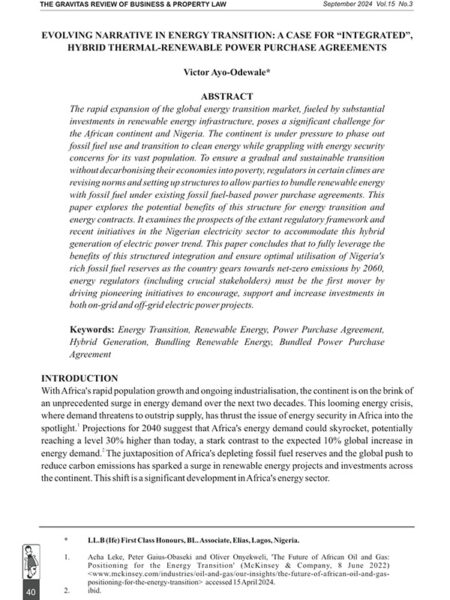
Evolving Narrative in Energy Transition – A Case for “Integrated”, Hybrid Thermal-Renewable Power Purchase Agreements
0₦2,500.00Victor Ayo-Odewale in his article, Evolving Narrative in Energy Transition – A Case for Integrated, Hybrid Thermal-Renewable Power Purchase Agreements, explores the implications of this structure for energy transition and energy contracts. Ayo-Odewale examines the prospects of the extant regulatory framework and recent initiatives in the Nigerian electricity sector to accommodate this hybrid generation of electric power trend. The rapid expansion of the global energy transition market backed by massive investment in renewable energy infrastructure presents a significant challenge for the African continent and, indeed, Nigeria. The continent is under pressure to phase out fossil fuel use and transition to clean energy while it continues to grapple with energy security concerns for its vast population. To ensure a gradual and sustainable transition without decarbonizing their economies into poverty, regulators in certain climes are revising norms and setting up structures to allow parties to bundle renewable energy with fossil fuel under existing fossil fuel-based power purchase agreements. Ayo-Odewale concludes that to fully leverage the benefits of this structured integration and ensure optimal utilization of Nigeria’s rich fossil fuel reserves as the country gears towards net-zero emissions by 2060, energy regulators (including key stakeholders) must be the first mover by driving pioneering initiatives to encourage, support and increase investments in both on-grid and off-grid electric power projects.
-
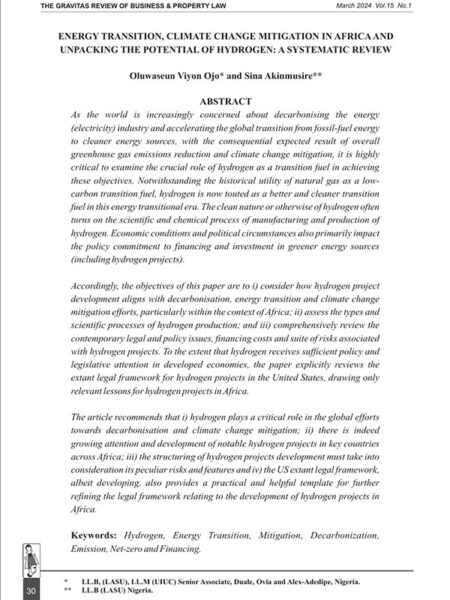
Energy Transition, Climate Change Mitigation in Africa and Unpacking the Potential of Hydrogen: A Systematic Review
0₦2,500.00Oluwaseun Viyon Ojo and Sina Akinmusire, in their article, Energy Transition, Climate Change Mitigation in Africa and Unpacking the Potential of Hydrogen: A Systematic Review, address increasing concerns about decarbonizing the energy (electricity) industry and accelerating the global transition from fossil-fuel energy to cleaner energy sources. With the consequential expected result of overall greenhouse gas emissions reduction and climate change mitigation, it is extremely critical to examine the crucial role of hydrogen as a transition fuel in achieving these objectives. Notwithstanding the historical utility of natural gas as a low-carbon transition fuel, hydrogen is now touted as a better and cleaner transition fuel in this energy transitional era. The clean nature or otherwise of hydrogen often turn on the scientific and chemical process of manufacturing and production of hydrogen. Crucially, economic conditions and political circumstances also largely impact the policy commitment to financing and investment in greener energy sources (including hydrogen projects). Ojo and Akinmusire address a number of cognate issues. They consider how hydrogen project development aligns with decarbonization, energy transition and to the extent that hydrogen is currently receiving sufficient policy and legislative attention in developed economies, the paper specifically reviews the extant legal framework for hydrogen projects in the United States, drawing only relevant lessons for hydrogen projects in Africa..
-
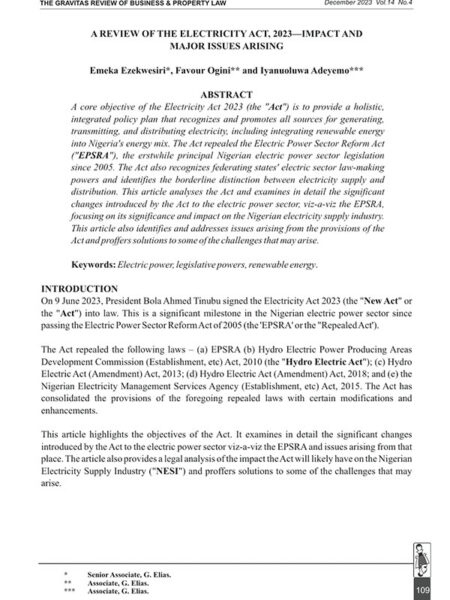
A Review of the Electricity Act, 2023 – Impact and Major Issues Arising
0₦2,500.00Emeka Ezekwesiri, Favour Ogini, and Iyanuoluwa Adeyemo, undertake a review of the Electricity Act 2023, its objectives, content and potential impact on the power regulatory landscape in Nigeria, in their article, A Review of the Electricity Act, 2023 – Impact and Major Issues Arising. The Act provides a holistic integrated policy plan that recognizes and promotes all sources for the generation, transmission, and distribution of electricity, including the integration of renewable energy into Nigeria’s energy mix. The Act repealed the Electric Power Sector Reform Act (the “EPSRA”), the erstwhile principal legislation of the Nigerian electric power sector since 2005. The Act also recognizes the electric sector law making powers of federating states and identifies the border line distinction between electricity supply and distribution. Ezekwesiri et al provide an analysis of the Act and examines in detail the major changes introduced by the Act to the electric power sector viz-a-viz the EPSRA with particular focus on its significance and impact in the Nigerian Electricity Supply Industry.
-
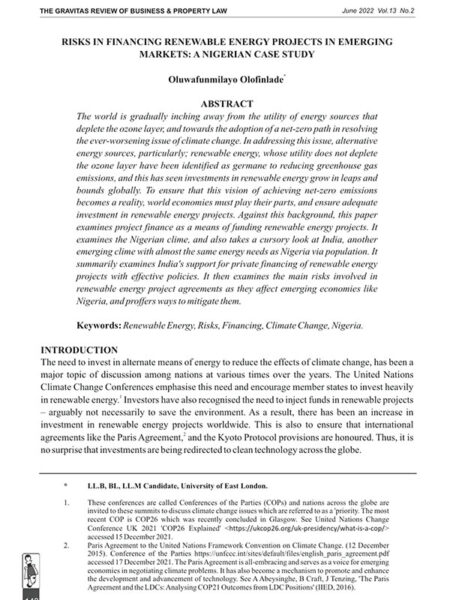
Risks in Financing Renewable Energy Projects in Emerging Markets: A Nigerian Case Study
0₦2,500.00Oluwafunmilayo Olofinlade of the University of East London UK, in her paper, Risks in Financing Renewable Energy Projects in Emerging Markets: A Nigerian Case Study, notes that the world is inching away from the use of energy sources that deplete the ozone layer and towards the adoption of a net-zero path in resolving the ever-worsening issue of climate change. Alternative energy sources whose utility does not deplete the ozone layer have been identified as germane to reducing greenhouse gas emissions. This has seen remarkable investments in renewable energy globally. Oluwafunmilayo examines renewable energy financing in Nigeria. She considers the main risks involved in renewable energy project agreements as they affect emerging economies like Nigeria and proffers ways to mitigate them.
-
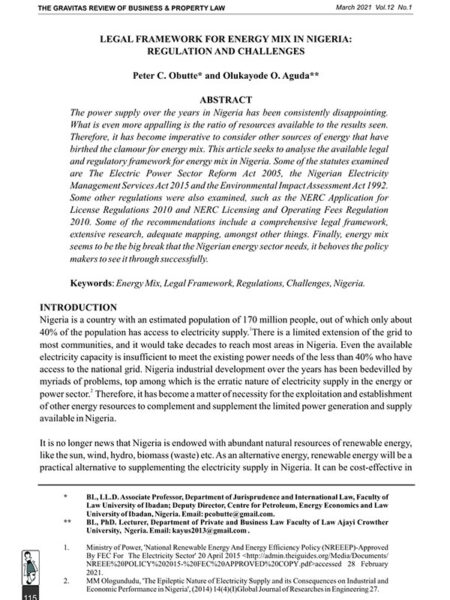
Legal Framework for Energy Mix in Nigeria: Regulation and Challenges
0₦2,500.00Dr Peter Obutte, Associate Professor, Faculty of Law, University of Ibadan and Dr Olukayode Aguda of the Faculty of Law, Ajayi Crowther University, in their article, Legal Framework for Energy Mix in Nigeria: Regulation and Challenges, note that energy mix refers to the combination of the various primary energy sources used to meet energy needs: fossil fuels (oil, natural gas and coal), nuclear energy, and renewable energy sources. Dr Obutte and Dr Aguda analyse the legal and regulatory framework for energy mix in Nigeria. They posit that energy mix seems to be the big break that the Nigerian energy sector needs, and it behooves the policymakers to see it through successfully with a comprehensive legal framework, extensive research and adequate mapping, amongst other things.
-
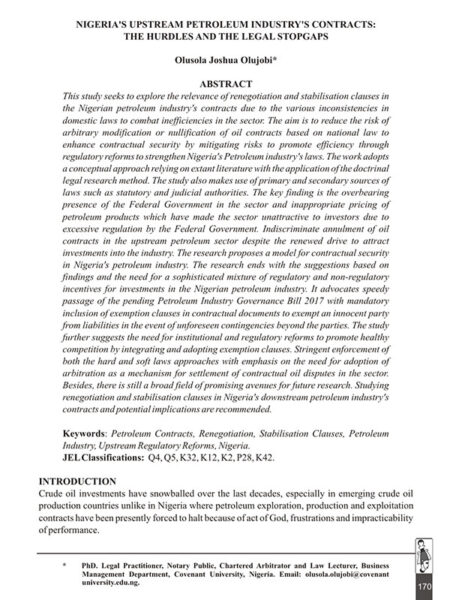
Nigeria’s Upstream Petroleum Industry’s Contracts: The Hurdles and the Legal Stopgaps
0₦2,500.00Dr Olusola Olujobi of the Business Management Department Covenant University Ota Nigeria in his article, Nigeria’s Upstream Petroleum Industry’s Contracts: The Hurdles and the Legal Stopgaps, explores the relevance of renegotiation and stabilisation clauses in the Nigerian petroleum industry’s contracts due to the various inconsistencies in domestic laws to combat inefficiencies in the sector. The overbearing presence of the Federal Government in the oil and gas sector and inappropriate pricing of petroleum products have made the sector unattractive to investors due to excessive regulation. Indiscriminate annulment of oil contracts is contrary to the government’s drive to attract investments and the need for contractual security in Nigeria’s petroleum industry. Dr Olujobi advocates the need for speedy passage of the Petroleum Industry Governance Bill 2017 and for institutional and regulatory reforms to promote healthy competition.
-
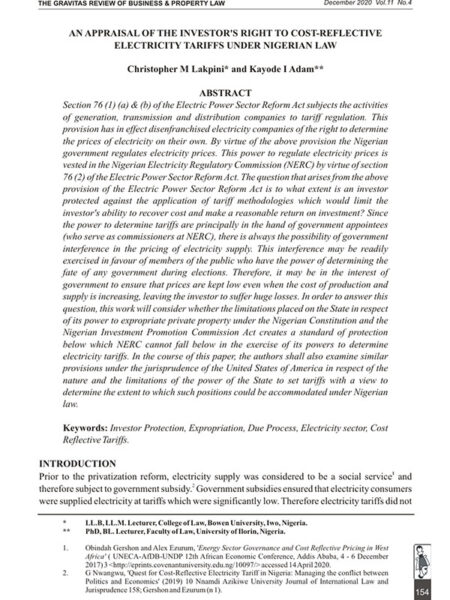
An Appraisal of the Investor’s Right to Cost-Reflective Electricity Tariffs Under Nigerian Law
0₦2,500.00Christopher Lakpini of the College of Law Bowen University Iwo Nigeria and Dr Kayode Adam of the Faculty of Law University of Ilorin Nigeria in their article, An Appraisal of the Investor’s Right to Cost-Reflective Electricity Tariffs Under Nigerian Law, observe that section 76 (1) (a) & (b) of the Electric Power Sector Reform Act (the Act) subjects the activities of generation, transmission and distribution companies to tariff regulation. This provision has robbed electricity companies of the right to determine the price of electricity automatically. Lakpini and Adam examine if power sector investors have a right to recover their cost and make a reasonable return on investment. They consider whether the limitation imposed by the Act amounts to expropriation under Nigerian law, and the treatment of similar provisions under the United States jurisprudence.
-
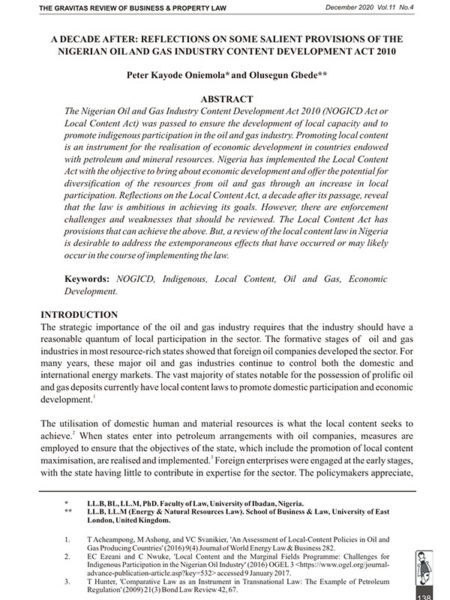
A Decade After: Reflections on Some Salient Provisions of the Nigerian Oil and Gas Industry Content Development Act 2010
0₦2,500.00Dr Peter Oniemola of the Faculty of Law University of Ibadan Nigeria and Olusegun Gbede of the School of Business & Law University of East London the United Kingdom in their article, A Decade After: Reflections on Some Salient Provisions of the Nigerian Oil and Gas Industry Content Development Act 2010, review the provisions of the Nigerian Oil and Gas Industry Content Development Act against the essence and expectation of the Act. They consider the achievements of the Act and challenges in realising its objectives.
-
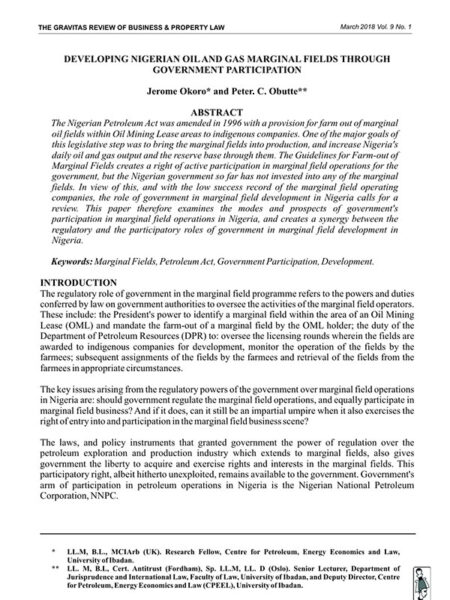
Developing Nigerian Oil and Gas Marginal Fields through Government Participation
0₦2,500.00Jerome Okoro and Dr. Peter Obutte, of the Centre for Petroleum, Energy Economics and Law, University of Ibadan in their article, “Developing Nigerian Oil and Gas Marginal Fields through Government Participation”, define what qualifies as a marginal field and note that the 1996 amendment to the Petroleum Act provides for farming out of marginal oil fields within Oil Mining Lease areas to indigenous companies. A major goal of the law was to bring the marginal fields into production, and increase Nigeria’s daily oil and gas output and the reserve base through them. Though the Guidelines for Farm-out of Marginal Fields creates a right of active participation in marginal field operations for the government, the Nigerian government so far has not invested into any of the marginal fields Okoro and Obutte undertake a review of the Nigerian marginal field development program, the legal basis of regulatory role of government, structure of Nigerian petroleum operations and expected reforms under the Petroleum Industry Governance Bill, 2017.
-
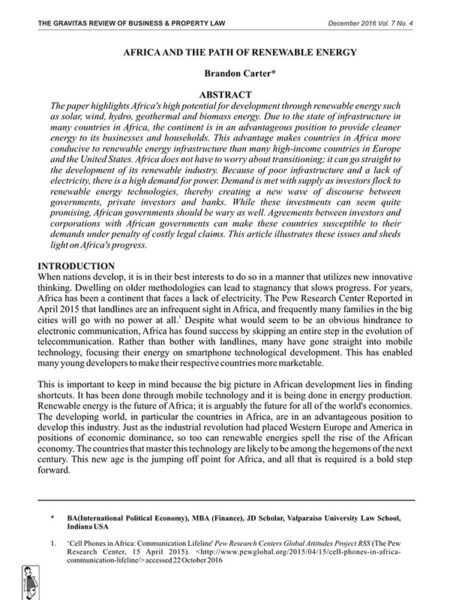
Africa and the Path of Renewable Energy
0₦2,500.00Brandon Carter, international political economist and JD Scholar, Valparaiso University Law School, Indiana USA in his article “Africa and the Path of Renewable Energy” highlights Africa’s potential for development through renewable energy such as solar, wind, hydro, geothermal and biomass. Just as countries in Africa skipped the transition to landlines in the telecommunications industry, he posits that Africa’s poor energy infrastructure deficit is an opportunity to leapfrog fossil fuel energy to clean renewable energy. While prospecting for foreign investments to fund renewable energy projects, he cautions African countries against Bilateral Investment Treaties (BITs) with Europe and the US especially those under the International Centre for the Settlement of Investment Disputes (ICSID) and advocated South-South BITs which are less skewed against capital importing countries.
-
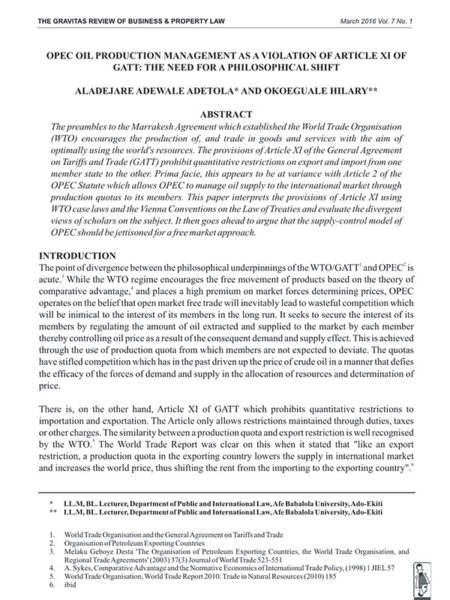
OPEC Oil Production Management as a Violation of Article XI of GATT: The Need for a Philosophical Shift
0₦2,500.00Aladejare Adetola and Okoeguale Hilary of the Department of Public and International Law, Afe Babalola University, Ado-Ekiti in their article “OPEC Oil Production Management as a violation of Article XI of GATT: The Need for a Philosophical Shift” analyses contending positions on whether OPEC oil production quota violates Article XI of the General Agreement on Tariffs and Trade (GATT) which prohibits quantitative restrictions on export and import from one member state to the other. Interestingly, the decisive element in the controversy may be whether oil is a “good” or “product”.
-
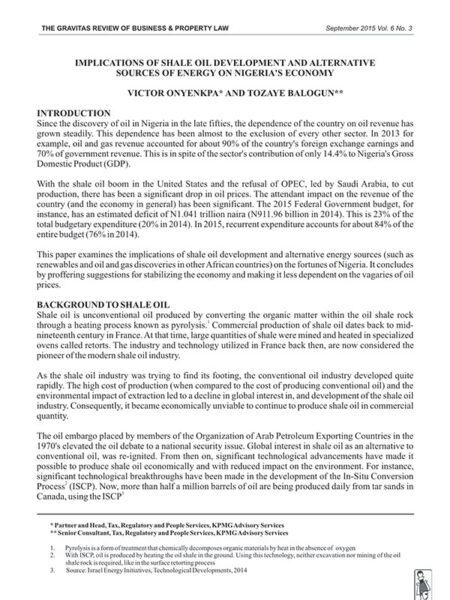
Implications of Shale Oil Development and Alternative Sources of Energy on Nigeria’s Economy
0₦2,500.00It is not just another scare: Victor Onyenkpa and Tozaye Balogun, Partner and Senior Consultant respectively, KPMG Advisory Services, with facts and figures, examine the dire consequences of the development of Shale Oil on Nigeria’s economy. Their article, “Implications of Shale Oil Development and Alternative Sources of Energy on Nigeria’s Economy” however proffers a way out.
The Gravitas Review of Business & Property Law



